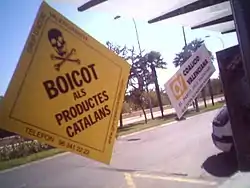Anti-Catalanism
Anti-Catalanism (Catalan: anticatalanisme, IPA: [ˌantikətələˈnizmə]) is the collective name given to various alleged historical trends in Spain that have been hostile to Catalan culture and traditions.
| Part of a series on |
| Discrimination |
|---|
 |

In more recent times it is a term used to criticize political stances contrary to Catalan nationalism or Catalan independentism, both inside and outside Catalonia.
Description
In a historical context, anti-Catalanism expresses itself as a hostile attitude towards the Catalan language, people, traditions or anything identified with Catalonia. In a political context it may express itself as the reaction to a perceived intrusion of Catalan political nationalism into the area. In its most extreme circumstances, this may also be referred as Catalanophobia, though it is not a phobia per se. Several political movements, known for organising boycotts of products from Catalonia, are also actively identified with anti-Catalanism.
In 1482, the suppression and burning of the Valencia Bible, the first bible in the catalan language, occurred.
In accordance with a new decree of Philip V, which abolished Catalan laws and institutions after the War of succession,[1] which ended in 1714, the marginalization of the Catalan language and culture gradually increased in favor of the Castilians. The new Plant Decree was a royal measure aimed at suppressing those who were defeated during the Inheritance War, and it initiated the creation of a Spanish centralized state in accordance with the laws of Castile, and for the first time founded the Kingdom of Spain. This centralization took quite some time during the nineteenth and early twentieth centuries, reaching maximum levels during the dictatorship of Franco and the White Terror.
Italy
Historian Antoni Simon states that between the 12th and 15th centuries, Catalonia's military expansion into Sicily, Sardinia and southern Italy and the entry of Catalan merchants into these markets generated a deep sense of hostility against the Catalans - often identified as Spaniards. Reflections can be found in the literary works of Dante Alighieri, Giovanni Boccaccio, Francesco Petrarca, Luigi Alamanni, Pietro Aretino or Serafino Aquilano. He claims it was a more cultural-linguistic rather than politico-territorial anti-Catalan sentiment, due to protests over the election of Alfonso de Borja in 1455 as Pope Calixto III to be a barbarian and a Catalan.